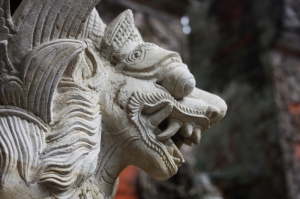 The recent lecturing of the Abbott government to the Indonesian government about what Australia will do about asylum-seeker boats is an affront to Indonesian sovereignty on several levels. Firstly, we (that is Western Europeans) forced the concept of sovereignty on to Asia and for us to then impose our ideals on another sovereign nation-state is arrogant and dismissive of that state; and the laws we insisted they accept. Secondly, it reflects Australia’s contempt of Indonesia in that we insist they adopt our policies unquestioningly, meanwhile Australia slashes its international aid budget to ‘rub salt in the wound.’ Thirdly it reflects an ongoing contempt Australia has for a nation that should be respected as a powerful regional actor, one that is fast becoming an assertive neighbour.
The recent lecturing of the Abbott government to the Indonesian government about what Australia will do about asylum-seeker boats is an affront to Indonesian sovereignty on several levels. Firstly, we (that is Western Europeans) forced the concept of sovereignty on to Asia and for us to then impose our ideals on another sovereign nation-state is arrogant and dismissive of that state; and the laws we insisted they accept. Secondly, it reflects Australia’s contempt of Indonesia in that we insist they adopt our policies unquestioningly, meanwhile Australia slashes its international aid budget to ‘rub salt in the wound.’ Thirdly it reflects an ongoing contempt Australia has for a nation that should be respected as a powerful regional actor, one that is fast becoming an assertive neighbour.
What message is this decidedly non-cosmopolitan attitude by the Abbott government sending the Indonesians? Is it that Indonesia should remain obsequious to Australia’s political and regional requirements? :not unlike that of Australia to the United States (US). This is a very dangerous move by Australia which will have consequences both politically and militarily.
The simple notion of respect aside, surely the continuing rise of China means that Australia should be seeking Indonesia’s active and equal involvement in the region in a diligent and inclusive way and not asserting its authority as a bygone regional colonial master. Those days are long gone and it would be helpful for future regional strategic stability if the Abbot government thoroughly understood this concept. Moreover, the rise of China should encourage Australia not to antagonise the Indonesian government as the stark reality is that China-Indonesia relations will improve exponentially if Australia continues to act in this way.
What are the possible outcomes of such a situation?
- Indonesia will exclude Australia from input into the region as it grows into a much more active participant in the region;
- Indonesia will more likely side with China as it moves to establish who is ‘with it’ and who is ‘against it’; and
- China will favour Indonesia–and come to its aid militarily–if there is conflict in a ‘boat tow back’ situation.
Bearing in mind that the aid China provides to Indonesia is now four times that of what the US once donated to the country, it is not difficult to assess who’s side Indonesia would take if the situation deteriorated, and whilst linking these two seemingly far-apart aspects might seem problematic, Australia should be aware that other country’s are also free to do what they wish. Take the recent president of Afghanistan’s statement that his country would side with Pakistan, if Pakistan went to war with the US. A statement like this reflects an attitude by developing countries that they will not be dictated to by developed countries anymore.
The Abbott government should recognize how insulting its attitude to Australia’s nearest Asian neighbour is, and quickly move to appease it. The western Pacific is rapidly heating up as the epicentre of future conflict and therefore, time is short.
